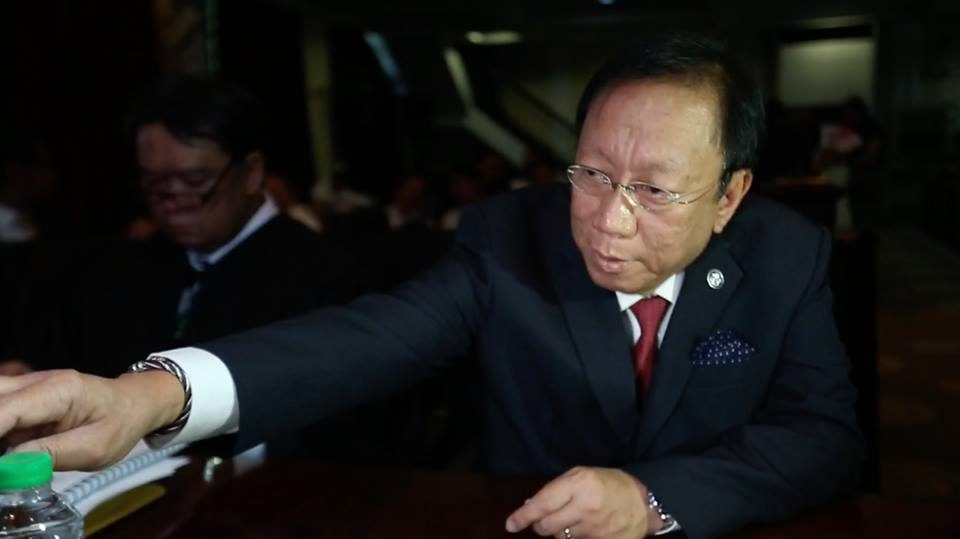SUMMARY
This is AI generated summarization, which may have errors. For context, always refer to the full article.

MANILA, Philippines (UPDATED) – Solicitor General Jose Calida said on Wednesday, June 14, that the martial law declaration in Mindanao does not give President Rodrigo Duterte additional powers compared to the Chief Executive’s calling out power.
Calida made the admission as he was interpellated by Associate Justice Mariano del Castillo on the second day of oral arguments on petitions seeking to nullify martial law in Mindanao.
“Technically, there’s not much difference,” Calida said.
During his interpellation, Senior Associate Justice Antonio Carpio pressed Calida to differentiate martial law and the President’s calling out power.
The Solicitor General likened the the martial law declaration in Mindanao to ending a statement with an exclamation point – to make sure one is heard loud and clear.
“It’s like a sentence, instead of a period, there’s an exclamation point….It’s psychological, an exclamation point – you better listen to me now because I imposed martial law,” Calida said.
Not satisfied, Carpio said, “We’re talking here about legal powers; we’re not talking here about exclamation points.”
Calida explained that it creates a “psychological” effect meant to send a clear message to terrorists in Marawi City.
However Carpio noted that members of the Maute Group apparently ignored the martial law declaration, as fighting still continued since it was imposed on May 23.
Duterte exercised his calling out power in issuing Proclamation 55, the presidential proclamation on a state of national emergency on account of lawless violence in Mindanao after the Davao City bombing in September 2016. The President has yet to lift Proclamation 55.
Calida said that while Proclamation 55 was still in effect, Duterte decided to declare martial law in Mindanao anyway.
“Well, technically speaking, Proclamation 55 was still existent at that time, but when he saw rebellion, he had to act decisively and quickly so he decided to use martial law tool to save Marawi City,” he said.
Calida said in his consolidated comment submitted to the SC that Proclamation 55 was “ineffective,” justifying the declaration of martial law in Mindanao.
‘Calling out power on steroids’
Calida also likened the martial law declaration as the President’s exercise of his “calling out powers on steroids” to further prove his point. This did not escape the scrutiny of Chief Justice Maria Lourdes Sereno, when it was her turn to interpellate the Solicitor General.
Sereno pointed out the quick, cosmetic effects of steroids against their long-term health consequences, in apparent comparison to the martial law declaration in Mindanao.
“I have been enlightened by a new phrase – martial law is calling out power on steroids. Actually, it’s very illuminating for me, but what are the side effects of taking steroids?…They include acne, blurred vision, cataract, bruising, high blood pressure, weight gain. But they also say steroids do not cure the ill,” Sereno said.
“Steroids can give the appearance of greater power and lesser inflamation. If it is important to us to get the legal standards before martial law can be declared, we need to inocculate our armed forces from the possible idea that they are an armed forces on steroids,” she added.
Realizing his flawed comparison, Calida told the Chief Justice: “Don’t take my phraseology literally. It’s just a figure of speech; don’t take me seriously on that.”
He later clarified that what he meant by likening martial law to “calling out power on steroids” is that the military is better equipped than the police to stamp out a rebellion.
In his interpellation, Carpio said martial law did not give the President any new powers that he did not already possess prior to the declaration, adding that the people should be informed about this.
The final day of the oral arguments is on Thursday, June 15, which Defense Secretary Delfin Lorenzana and Armed Forces chief Eduardo Año or their representatives had been ordered by the High Court to attend. – Rappler.com
Add a comment
How does this make you feel?
There are no comments yet. Add your comment to start the conversation.